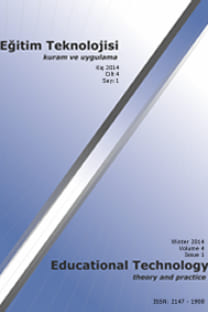BT ÖĞRETMENLERİNİN CEVRİMİÇİ FORUMLARDA TARTIŞTIKLARI KONULARIN KÜLTÜRLER ARASI KARŞILAŞTIRMASI: TÜRKİYE-İNGİLTERE ÖRNEĞİ
BT öğretmenleri, çevrimiçi tartışma forumları, eğitimdeki değişimler, profesyonellik
___
- Atal-Köysüren, ve Deryakulu, D. (2017). Eğitim politikalarındaki değişimlerin bilişim teknolojileri öğretmenlerinin duyguları üzerindeki etkisi. Eğitim ve Bilim, 42(190), 67- 87.
- Coleman, M. R., Gallagher, J. J., & Job, J. (2012). Developing and sustaining professionalism within gifted education. Gifted Child Today, 35(1), 27-36.
- Darling-Hammond, L. (2005). Teaching as a profession: Lessons in teacher preparation and professional development. Phi Delta Kappan, 87(3), 237-240.
- Day, C., Kington, A., Stobart, G., & Sammons, P. (2006). The personal and professional selves of teachers: Stable and unstable identities. British Educational Research Journal, 32(4), 601-616.
- Day, E. (2002). Me, my*self and I: personal and professional reconstructions in ethnographic research. FQS Forum: Qualitative Social Research, 3(3), 1‐23.
- Dede, C., Jass Ketelhut, D., Whitehouse, P., Breit, L., & McCloskey, E. M. (2009). A research agenda for online teacher professional development. Journal of Teacher Education, 60(1), 8-19.
- Delahunty, J. (2012). ‘Who am I?’: Exploring identity in online discussion forums. International Journal of Educational Research, 53, 407-420.
- Deryakulu, D., & Olkun, S. (2007). Analysis of computer teachers’ online discussion forum messages about their occupational problems. Educational Technology & Society, 10(4), 131-142.
- Englund, T. (1996). Are professional teachers a good thing. In I. F. Goodson, & A. Hargreaves (Eds.), Teachers’ Professional Lives, London: Falmer Press.
- Evans, L. (2011). The ‘shape’of teacher professionalism in England: Professional standards, performance management, professional development and the changes proposed in the 2010 White Paper. British Educational Research Journal, 37(5), 851-870.
- Fraenkel, J. R., & Wallen, N. E. (2006). How to design and evaluate research in education. United States of America: The Mc-Graw-Hill Companies.
- Goos, M. E., & Bennison, A. (2008). Developing a communal identity as beginning teachers of mathematics: Emergence of an online community of practice. Journal of Mathematics Teacher Education, 11(1), 41-60.
- Hargreaves, A., & Goodson, I. (1996). Teachers’ professional lives: Aspirations and actualities. In I. Goodson & A, Hargreaves (Eds.), Teachers’ Professional Lives, (1-17), London: Falmer Press.
- Hiebert, J., Gallimore, R., & Stigler, J. W. (2002). A knowledge base for the teaching profession: What would it look like and how can we get one? Educational Researcher, 31(5), 3-15.
- Hildebrandt, S. A., & Eom, M. (2011). Teacher professionalization: Motivational factors and the influence of age. Teaching and Teacher Education, 27(2), 416-423.
- Hou, H. T., Sung, Y. T., & Chang, K. E. (2009). Exploring the behavioral patterns of an online knowledge-sharing discussion activity among teachers with problem-solving strategy. Teaching and Teacher Education, 25(1), 101-108.
- Hough, B., Smithey, M., & Evertson, C. (2004). Using computer-mediated communication to create virtual communities of practice for intern teachers. Journal of Technology and Teacher Education, 12, 361-386.
- Irwin, B., & Hramiak, A. (2010). A discourse analysis of trainee teacher identity in online discussion forums. Technology, Pedagogy and Education, 19(3), 361-377.
- Ivanic, R. (1998) Writing and Identity: The discoursal construction of identity in academic writing. Amsterdam: John Benjamins.
- Jamissen, G., & Phelps, R. (2006). The role of reflection and mentoring in ICT teacher professional development: Dialogue and learning across the hemispheres. Teacher Development, 10(3), 293-312.
- Lock, J. V. (2006). A new image: Online communities to facilitate teacher professional development. Journal of Technology and Teacher Education, 14(4), 663-678.
- McKernan, J. (2008). Curriculum and imagination: Process theory, pedagogy and action research. New York: Routledge.
- Merriam, S. B. (2009). Qualitative research: A guide to design and implementation (Revised and expanded from qualitative research and case study application in education). San Francisco: Jossey-Bass/Wiley.
- Prestridge, S. (2010). ICT professional development for teachers in online forums: Analysing the role of discussion. Teaching and Teacher Education, 26(2), 252-258.
- Sachs, J. (2001) Teacher professional identity: Competing discourses, competing outcomes, Journal of Education Policy, 26(2), 149-161.
- Sachs, J. (2016). Teacher professionalism: Why are we still talking about it?. Teachers and Teaching, 22(4), 413-425.
- Schuck, S., & Foley, G. (1999). Viewing mathematics in new ways: Can electronic learning communities assist. Mathematics Teacher Education and Development, 1(1), 22-37.
- Selwyn, N. (2000). Creating a “Connected” community? Teachers' use of an electronic discussion group. Teachers College Record, 102(4), 750-78.
- Shulman, L. S. (1998). Theory, practice and the education of professionals. The Elementary School Journal, 98(5), 511-526.
- Sutherland, L., Howard, S., & Markauskaite, L. (2010). Professional identity creation: Examining the development of beginning preservice teachers' understanding of their work as teachers. Teaching and Teacher Education, 26(3), 455-465.
- Wardoyo, C., Herdiani, A., & Sulikah, S. (2017). Teacher Professionalism: Analysis of professionalism phases. International Education Studies, 10(4), 90-100.
- ISSN: 2147-1908
- Yayın Aralığı: Yılda 2 Sayı
- Başlangıç: 2011
- Yayıncı: Tolga Güyer
Sinan KESKİN, Furkan AYDIN, Halil YURDUGÜL
Deniz DERYAKULU, Deniz ATAL, Raziye SANCAR
Seyfullah GÖKOĞLU, Ünal ÇAKIROĞLU
3B TASARIM ÖĞRENME DENEYİMİNİN SÜREÇ DEĞERLENDİRMESİ VE EĞİTSEL ÇIKTILARININ KEŞFEDİLMESİ
Akça Okan YÜKSEL, Burcu BERİKAN, Ekmel ÇETİN
Yıldız ÖZAYDIN AYDOĞDU, Şeyhmus AYDOĞDU, Mehmet Akif OCAK
VİDEO KAPILMA ÖLÇEĞİNİN UYARLAMA, GEÇERLİK VE GÜVENİRLİK ÇALIŞMASI
Deniz DERYAKULU, Raziye SANCAR, Ömer Faruk URSAVAŞ
EĞİTİMDE SANAL GERÇEKLİK UYGULAMALARINDA ERİŞİLEBİLİRLİK VE UYUMLULUK
Mehmet BÜTÜN, Veli Özcan BUDAK, Murat SELÇUK, İlkim Ecem EMRE, İrfan ŞİMŞEK
BİLİŞİM TEKNOLOJİLERİ ALANINDA MESLEK SEÇİMİNİ YORDAYAN DEĞİŞKENLER
ÇEVRİMİÇİ ÖDEV GÖNDERME VE DÖNÜT ALMA SÜRECİNDE ÖĞRENCİ KATILIM DAVRANIŞLARI
Özden ŞAHİN İZMİRLİ, Gökhan ÇALIŞKAN, Serkan İZMİRLİ
E-ÖĞRENME ORTAMLARINDA ALGILANAN KARMAŞIK GÖREV PERFORMANS ÖLÇEĞİ
